May 1, 2018
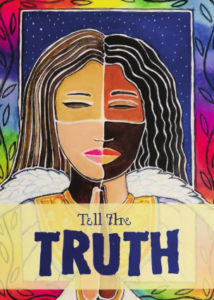 by Leah Landry, Precious Blood Volunteer
by Leah Landry, Precious Blood Volunteer
Most white people do not want to talk about race. In fact, I feel uncomfortable typing this article right now. I am so scared of saying something wrong or implying something hurtful so it would be easier to stay silent. But after Chicago Regional Organizing for Anti-Racism’s training (C-ROAR), I realize it does not matter what I want or what is easy: we have to talk about race.
I knew early on that racism existed. When I was eight years old, my brother’s best friend joined our family. Shaun is African American and I saw that he was treated differently than my Caucasian brothers in our predominately white neighborhood. I remember Shaun and me getting weird looks when we were together and the police pulling him over much more often than my white brothers. But our conversations at home were about how other people were discriminatory, never about how racism worked through us as white people. I knew I had white privilege, but I did not realize I was part of the problem.
As a year-long volunteer at Precious Blood Ministry of Reconciliation (PBMR), all my suspicions that racism ran deeper than I could articulate intensified. I see every day how people are discriminated against because of the color of their skin. In the Juvenile Temporary Detention Center, I was overwhelmed and appalled by the disproportionate number of black and brown teens my city locks up. While working at PBMR, I accompanied a young woman to court and was immediately told I could use the shorter line because the guard mistook me—the only white woman in the crowd—as a lawyer. I met young men who were given tickets for jaywalking and biking on the sidewalk while I had escaped every instance of a police stop with nothing more than a warning. I witnessed intense poverty: people struggling to pay rent, afford clothes, or feed a family, always one crisis away from losing everything. I saw all this and knew that there must be root causes, but I did not understand the depth to which racism and white supremacy created and perpetuated these circumstances.
Through the anti-racism training and researching on my own, I learned that racism is at the heart of every one of these issues. I discovered that nationwide policies of redlining forced black families into segregated neighborhoods and denied them access to the same government-backed loans that allowed my own grandparents to buy a home (“A Case for Reparations”, Ta-Nehesi Coates). I found out how the criminal justice system is designed to target, imprison, and harass people of color (The New Jim Crow, Michelle Alexander). I learned how the inequities originated: not because of something inherent or lacking in communities of color, but because of structures that intentionally privilege white people and subjugate people of color.
The hardest lesson I learned is that racism is not just the overt, stereotypical racism we immediately think of, like the KKK or the rally in Charlottesville. It is the deep-rooted racism of unconscious bias that lies within all of us, because we were all raised in a racist society. This was and still is hard to fully comprehend for me. I, in my ignorant whiteness, perpetuate racism, even though I have a black brother who I love dearly, even though I say I am committed to racial equity and justice, even though my family told me to love everyone regardless of race. I have centuries of ingrained white supremacy born into me. I was raised in a society that was built on the backs of enslaved people of color and live in a country that continues to privilege white people.
The anti-racism weekend was transformational for me. It highlighted how entrenched white supremacy is and now I cannot un-see it. The most challenging part is that now I see racism play out in me. I catch myself stereotyping, preferring white people and white practices, making myself the center in spaces of color, and poking holes in stories of discrimination and racism. One particularly poignant moment of recognizing my own racism was when a person of color in the anti-racism training called me out for my racist behavior during the training itself. It is painful and embarrassing to admit it, but I know it is the truth. I hope that acknowledging my faults can clear the way for other white people to start noticing their own. Nothing is going to change until white people recognize that we are part of the problem, that we are perpetuating the system of white supremacy, whether consciously or unconsciously. But we cannot stop at recognizing that racism works through us, we also must begin to change.
Every time I recognize a way in which I am perpetuating white supremacy, I try to change my behavior and truly stand up for communities of color. I repeatedly question my actions in all my work at PBMR, since I am in a position of power over women of color. I am trying to rework the system so that the young women can be in charge. I am continuously investigating how I, as a white woman, can play a role without recreating unjust structures. I am educating myself on both the oppression and strengths of different communities of color, as I know that each community—and each individual for that matter—has a unique experience of discrimination. I am constantly trying to learn how to be more aware and understanding.
I know talking about race is hard. Believe me, writing this article was really hard, and scary. And we are going to falter and err sometimes. But that’s okay, because mistakes are part of the learning process. The only real mistake is if we do not try at all.
Leah is a current Precious Blood Volunteer serving at Precious Blood Ministry of Reconciliation in Chicago.
To learn more about becoming a Precious Blood Volunteer go to www.preciousbloodvolunteers.org.
Jan 24, 2018
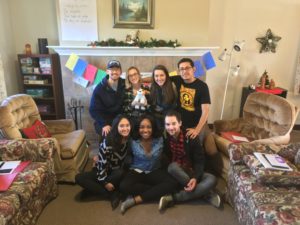
John Lee (far left, back row) pictured with his fellow 2017 Precious Blood Volunteers
During John Lee’s term of service as a Precious Blood Volunteer he spent a great deal of time organizing get togethers with the staff at Cristo Rey Kansas City High School where he served, setting up outings with the Precious Blood and Jesuit Volunteers, and initiated weekly sharing sessions with the Precious Blood Volunteer community in Kansas City. The experiences of helping connect people was something John wanted to continue after his service experience.
As he was wrapping up his term of service as a Precious Blood Volunteer at Cristo Rey in December he said he “brainstormed a bunch of ways I could pursue that goal and came across the idea of podcasting and felt that it could create that bridge!” He began writing, recording and producing a a podcast called “Starting With A Story.” “Starting With A Story” is a podcast that comes out on Monday mornings. John shares a wisdom story that covers topics from personal growth to life lessons to connecting with others. These stories are followed with John’s takeaways and specific parts of the story that resonate with him the most. The podcast finishes with a challenge to take on in order to improve and grow in your own lives based on the lessons from the story.
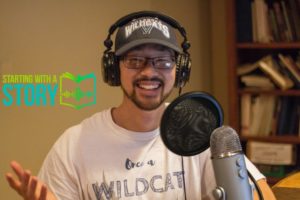
Former Precious Blood Volunteer John Lee (2017)
John will be completing his first season of “Starting with a Story” with the tenth episode. He is planning on starting work on Season 2 after a brief hiatus. His hope is to begin interviewing people about the stories they have shared with him.
You can listen to “Starting With A Story” at the podcast’s website, https://startingwithastory.com, or wherever you find your podcasts.
You can learn more about Precious Blood Volunteers at www.preciousbloodvolunteers.org.
Mar 2, 2017
by Tim Deveney, Director of Precious Blood Volunteers
A few weeks ago I had the pleasure of being part of a panel discussion hosted by Avila University’s Campus Ministry. The discussion centered around serving after graduation from college. It was a good discussion about our experiences as individuals and what we have learned from former volunteers. I was inspired by the stories and reflections I heard from the good people who were part of the panel.
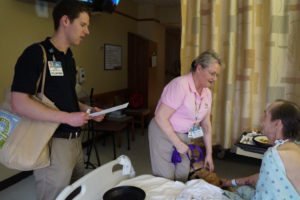
Former Precious Blood Volunteer, Nate Balmert, made an investment in his future
As part of the panel we took questions from Avila students and Avila’s Campus Ministry staff. They were great questions about why people should volunteer after graduation, what benefits they will receive and the impact they will make on the lives of the people they serve.
One of the questions that came up during the discussion was about how to explain serving after graduation to parental units. I translated the question as “How in the world do you justify to your parents working for little to nothing after spending four years racking up massive student loans?” It’s a great question and a responsible young adult (and parent) should probably wrestle with this question. I jumped right in and offered three of my thoughts on the question.
The first part of my response was about what we offer to our volunteers. We help out with loan deferrals. Additionally, at the end of a full year of service we provide an education award payable to either a loan provider or institution of higher learning. These get our volunteers on a path towards paying off the loans and having freedom from some of that debt earlier in their adult lives.
The second part of my response was that the students discerning a volunteer experience are adults. At some point they have to make decisions on their own. We accept only people who are over 18 and generally accept people who have completed a college degree or advanced technical training. Basically we want young adults to serve with us and we are going to treat them as adults.
As an adult they are ultimately responsible for the eventual repayment of those loans. We encourage our potential volunteers to include the people they love and trust (that hopefully includes parents!) in discerning whether or not to volunteer after graduation. In the end the person has to make the covenant as a volunteer willingly.
After I said all of this I told the students in attendance to not worry too much about the first two and focus on what I’m about to say next.
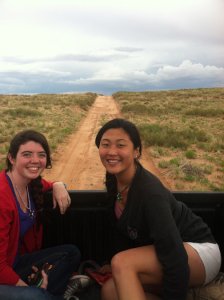
Former Precious Blood Volunteers, Kara McNamara (left) and Leah Yeo (right), made investments in the type of people they became.
Here’s why: By serving as a volunteer after graduation the person is making an investment in their future. It’s an investment in their future as a human being. It’s a great time to invest their time in learning how to be a better follower of Christ, to be challenged and supported by others in community. It’s a wonderful time to walk with and develop relationships with people who are struggling on the margins of our society.
What a person does when they enter the “real” world informs how they live their lives afterwards so why not do it now?
Learn more about becoming a Precious Blood Volunteer at www.preciousbloodvolunteers.org.
To apply to invest in your future as a Precious Blood Volunteer go to www.preciousbloodkc.org/pbv-apply/.
Feb 22, 2017
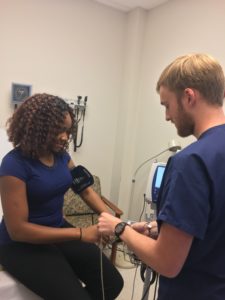
Current Precious Blood Volunteer, Koby Buth, taking a patient’s blood pressure at KC CARE Health Center
The Kansas City (KC) CARE Health Center is an integral part of the health care delivery system in the Kansas City community. As it was formed to do in 1971, the Health Center provides basic health care services to people who cannot afford them and to those challenged with access to care. KC CARE helps keep the uninsured and underinsured healthy!
The KC CARE Health Center promotes health and wellness by providing quality Care, Access, Research and Education to the underserved and all people in our community.
As a Precious Blood Volunteer serving at KC CARE Health Center you will be working at their clinic located in Midtown Kansas City. You will have the opportunity to work alongside doctors, nurses and a dedicated staff taking care of individuals regardless of their ability to pay. This is a placement for you if you are looking for a career in medicine or are interested in public health.
You can learn more about KC CARE Health Center by going to their website.
Read a reflection by former Precious Blood Volunteer, Lota Ofodile, about her experience at KC CARE here.
Read a reflection by former Precious Blood Volunteer, Jade Bowman, about her experience at KC CARE here.
You can apply to serve as a Precious Blood Volunteer at KC CARE Health Center by going to our “Apply” page.
Feb 1, 2017
by Kara McNamara, Precious Blood Volunteers Alumna
In my work for the past two years at an afterschool program for at-risk teenage boys, I got to see my students at their very best, at their screaming, fighting worst, and at every emotional stop in between. They certainly saw my full range of days too! I saw them go through hard times, saw them achieve great honors, saw them demonstrate resilience and ownership over their lives, saw them hurl ugly words at other children when they were hurting too badly to control themselves. I also, every so often, would have a luminous moment with a student in which I thought, This moment, right now, is exactly how God sees this child all of the time. I can think of an example in which one of the boys (who had been in foster care from a very young age and generally held himself apart from other people) celebrated his 18th birthday with us. We got him a cake with his name on it and sang to him and cheered his name (some of the students also tried to give birthday punches when I wasn’t looking). He was such a reserved, quiet young man, but in that moment, he couldn’t bite back his smile any longer, he couldn’t hold in the bright light inside him, and he let us see love and joy in his eyes. He quietly thanked everyone and mumbled something that sounded an awful lot like, “Love you guys.”
In looking at the transformation of this young man for those fleeting moments, I can remember thinking, This is why it’s so easy for God to love us. He must see us like this all of the time, with all of the potential for such good on full display.
In considering that moment, I was brought to thinking about all of the times that I’ve seen people at their best. Those moments are so inspiring, when you can see the purpose and joy living in a person. And I also thought about all the times I didn’t allow people to be their best or didn’t try to find their Creator in them. I missed so much beauty and joy in those missed opportunities!
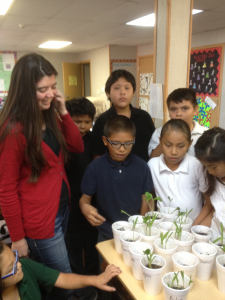
Kara McNamara with some of the kids she worked with as a Precious Blood Volunteer
In times of lack of unity and tension as we are seeing now on a large scale, we as Precious Blood people know that we must seek reconciliation, and as an initial step towards this, I am recommitting to seek Christ in those I meet, to encourage those around me to be the best version of themselves, and to recognize my own identity as God’s creation when I’m not at my best. If we could even begin to see each other as God sees us, our world could be a place of such healing and love, not division and hopelessness. If we can find that commonality, we can then begin to do the hard work that must come to address pain and inequality: standing in the margins, holding steadfast as peacemakers in the midst of tension, and starting the work of realizing God’s vision for the human family and environment.
After all, as Mother Teresa shared, “If we have no peace, it is because we have forgotten we belong to each other.” I hope you’ll join me in working and praying for reconciliation and recognition of God’s presence in those around us.
Kara McNamara served as a Precious Blood Volunteer in Crownpoint, New Mexico in 2013. She is a graduate of the University of Dayton.
To learn more about Precious Blood Volunteers go to www.preciousbloodvolunteers.org or contact us at volunteers@preciousbloodkc.org.
To apply to become a Precious Blood Volunteer go to https://preciousbloodkc.org/pbv-apply/
 by Leah Landry, Precious Blood Volunteer
by Leah Landry, Precious Blood Volunteer





